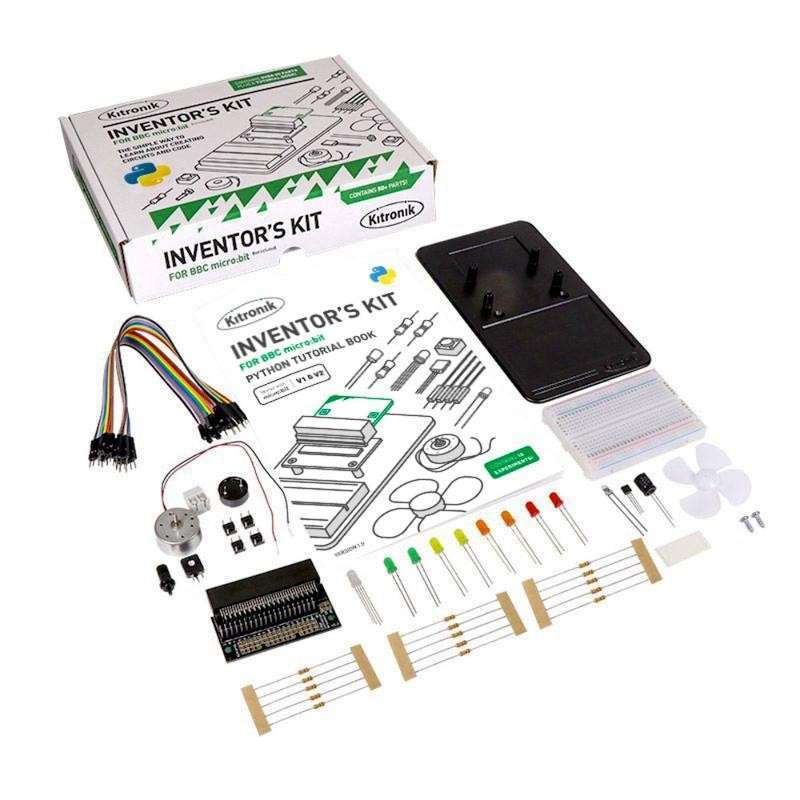


RLX COMPONENTS s.r.o. , Electronic Components Distributor.



Kitronik Inventors Kit for the BBC micro:bit - Python version (KIT-5669)
The Kitronik Inventor's Kit - Python version for the BBC micro:bit is a great way to get started with programming and hardware interaction with the BBC micro:bit. This Inventor's Kit contains everything you need to complete 10 experiments including using LEDs, motors, photoresistors and capacitors. To get you off to a flying start, we have included an easy to follow tutorial book which guides you through everything you will need to know about programming the BBC micro:bit. You don't need any experience with programming as the tutorial book will guide you every step of the way. You'll be programming and creating circuits in no time!
The tutorial offers step by step guides to all 10 experiments. Experiments 1 - 6 are coded with MakeCode Blocks and experiments 7 - 10 are coded with the MakeCode Python editor. The Python version tutorial booklet has been written especially for this version and will walk the user through creating the code and the circuits. In the original Inventor's kit experiments 7 - 10 are coded with JavaScript.
The Kitronik Inventor's Kit - Python version for the BBC micro:bit provides a fantastic way of learning how to construct and control electronic circuits. The BBC micro:bit has a selection of pins that are located on the bottom edge of its PCB. By using our specially designed Edge Connector Board for the BBC micro:bit in conjunction with the breadboard, it is easy to use these pins to connect additional components to the BBC micro:bit.
This kit is available as a single pack or as a pack of 20 for the classroom.
On its own, the Kitronik Inventors Kit offers a great introduction to the world of physical computing. The experiments showcase how code and electronics can combine to create real-world every day practical solutions to situations and problems. Harnessing the power of the elements, using sensory input to make things happen, and using variable input amounts to effect a gradual change are just some of the things you can learn as you progress through the experiments. But why stop there?
In our homes, schools and offices we are surrounded by consumer electronics that at their core, are physical computing devices. Coded electronic devices are everywhere. Many of these devices have been coded to communicate things to us, both visually and audibly. The three add-on packs for the inventors kit have been specifically devised to introduce you to these aspects of practical physical computing.
Every single pack contains;
All of the experiments included in the booklet (listed below) are completed using the Microsoft MakeCode Editor.
| Exp No#. | Experiment Name. | Resource Type. |
|---|---|---|
| 1 | Say Hello to the BBC micro:bit. | Further Help. |
| 2 | Using a Light Sensor & analog inputs. | Full Experiment + Further Help. |
| 3 | Dimming an LED using a potentiometer. | Further Help. |
| 4 | Using a transistor to drive a motor. | Full Experiment + Further Help. |
| 5 | Using the accelerometer to control motor speed. | Further Help. |
| 6 | Setting the tone with a piezo buzzer. | Further Help. |
| 7 | Wind Power. | Full Experiment + Further Help. |
| 8 | Making a game using the compass. | Further Help. |
| 9 | Capacitor charge circuit. | Further Help. |
| 10 | Using an RGB LED. | Further Help. |
| 11 | Making a pedestrian crossing. | Full Experiment + Further Help. |
| 12 | Making a random dice. | Full Experiment + Further Help. |
Insight Resources Mr Bit is an online educational coding platform that also features sections devoted to some of our key micro:bit accessories, including this kit. This content has been developed by Insight Resources and any questions relating to them should be directed at their contact information. To access these resources, please visit;

Kitronik Inventors Kit for the BBC micro:bit - Python version (KIT-5669)

34.00 € tax excl.
check_circle
check_circle


